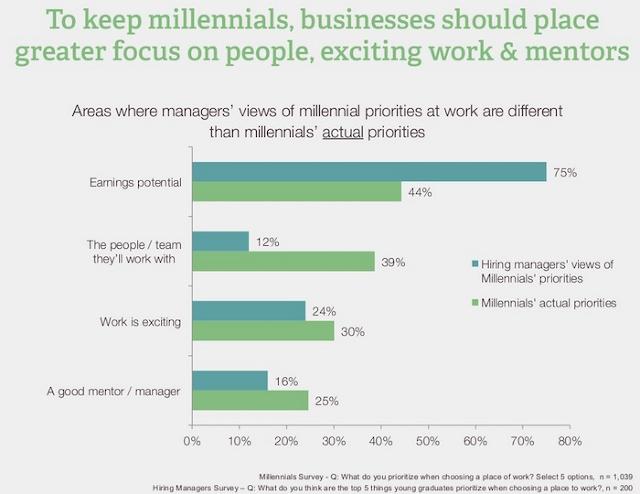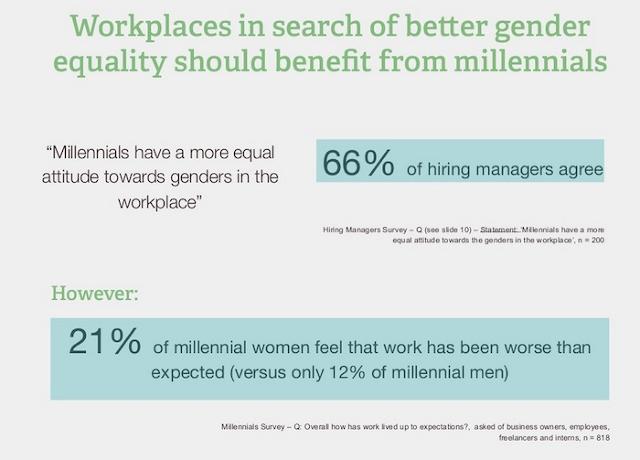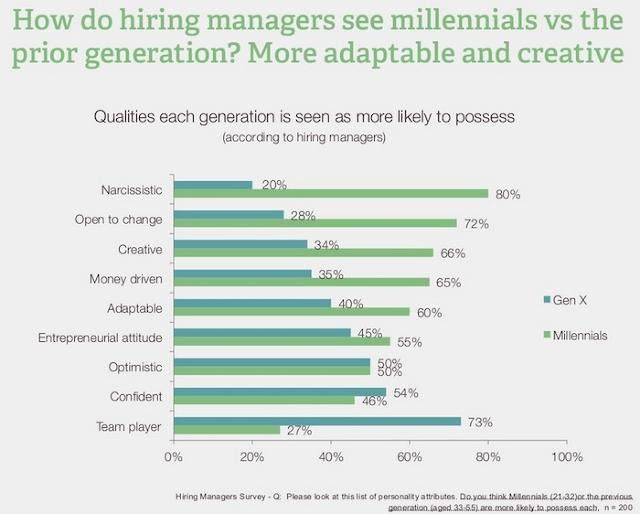Millennials Will Become The Majority In The Workforce In 2015. Is Your Company Ready?
Young people are clashing with traditional working environments, but soon they're going to be all the workers. Does the environment need to change, or do they?
Next year, people born between 1981 and 1996 are poised to become the new workforce majority and will eventually remake the workplace in their own image. That means office culture is in for big changes. As a new survey shows, this generation is already chafing at today's traditional company structures.
Freelancer platform Elance-oDesk and Millennial Branding, a research consultancy, interviewed more than a thousand working millennials and 200 older hiring managers to arrive at what they call the “disjoints” in thinking between these two generations. The two groups often had different perspectives on what’s important.
Roughly two-thirds of hiring managers agree that millennials have more equal attitudes toward genders in the workplace. But the report suggests that gender-based discrimination—whether it comes to salary or assignments—is still rife. More than 20% of millennial women say that when they arrive at their new jobs, they feel like work is worse than they expected. Only 12% of millennial men feel similarly.
Three-quarters of the gen X hiring managers assumed that millennials were primarily motivated by money. But when millennials answered the question about their top priority themselves, only 44% agreed. Meanwhile, gen X hiring managers underestimated how much millennials prized being part of a good team and working on exciting projects.
More than half of the hiring managers agreed that it was difficult to find and retain millennial labor. Nearly 80% of the millennials surveyed say they would consider quitting their existing jobs and working for themselves in the future.

That said, the report lists several reasons why millennials should be hopeful. Hiring managers value their technological adeptness and quick adaptability. But it remains to be seen whether traditional companies can evolve quickly enough to attract and hold onto young talent.
“It’s interesting because I think the companies that have the huge advantages are the smaller ones now,” offers Dan Schawbel, managing partner at Millennial Branding. “The Procter and Gambles of the world, for them to go back in time, it’s very hard. It’s definitely doable and they are making changes, but if you’re a new startup and you’ve got funding, you can start a new culture that supports people your age.”

Elance-oDesk’s senior vice president of marketing Jaleh Bisharat adds that millennials are also drawn to the flexible nature of freelancing. At the same time, it’s likely that depressing economic and social conditions (recession, recovery, a lack of stable jobs, etc.) may have forced their preferences.
“I think job security is being replaced by income security,” Bisharat says. “It is a more merciless corporate environment, actually, and individuals protect themselves by creating these different streams of income.”
Unsurprisingly, the report also describes the perception of millennials as narcissistic. Hiring managers overwhelmingly see millennials as navel-gazers over their gen X counterparts. But they also see millennials as more entrepreneurial and creative.

“It’s really like going back to the caveman days,” Schawbel says. “If you can’t kill your ownfood, you’re not going to make it. If you’re doing multiple things at once, millennials are like, ‘If I get laid off, then I’m fine.”
No comments:
Post a Comment